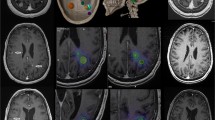Abstract
Dabrafenib is a potent BRAF inhibitor, which showed intracranial tumor activity. The purpose of our retrospective analysis was to evaluate the efficacy of dabrafenib for patients with melanoma brain metastasis (BM). We studied 30 BRAF mutant melanoma patients with BM, who received dabrafenib after local control of the brain between 2014 and 2017. Eastern Cooperative Oncology Group Performance Status (ECOG) was 0–2. The control arm consisted of 204 melanoma patients from our institutional melanoma database with BM and ECOG 0–2 treated with local therapies and/or chemotherapy, between 2003 and 2015. We found the intracranial disease control rate (DCR) was 83% including four (13%) complete remissions (CR), nine (30%) partial remissions (PR) and twelve (40%) stable diseases (SD) in contrast to five (17%) progressive diseases (PD). With a median follow-up of 14 months, median progression-free survival (PFS) and overall survival (OS) were 5.5 months, and 8.8 months, respectively. If calculated from BM onset, the OS turned to be 11.8 months on the dabrafenib arm, while it was only 6.0 months in the control arm (HR = 0.45, p = 0.0014). Higher risk of progression was observed with increasing ECOG (HR =4.06, p = 0.00027) and if more than 2 extracranial organs were involved (HR = 3.4, p = 0.0077). Elevated lactate dehydrogenase (LDH) was non-significantly associated with worse clinical outcome. Remarkable intracranial activity of dabrafenib in real practice was confirmed by our analysis.

Similar content being viewed by others
References
Falchook GS, Long GV, Kurzrock R et al (2012) Dabrafenib in patients with melanoma, untreated brain metastases, and other solid tumours: a phase 1 dose escalation trial. Lancet 379(9829):1893–1901
Long GV, Trefzer U, Davies MA et al (2012) Dabrafenib in patients with Val600Glu or Val600Lys BRAF-mutant melanoma metastatic to the brain (BREAK-MB): a multicentre, open-label, phase 2 trial. Lancet Oncol 13(11):1087–1095
Dummer R, Goldinger SM, Turtschi CP et al (2014) Vemurafenib in patients with BRAF(V600) mutation-positive melanoma with symptomatic brain metastases: final results of an open-label pilot study. Eur J Cancer 50(3):611–621
Colombino M, Capone M, Lissia A et al (2012) Vemurafenib in patients with BRAF/NRAS mutation frequencies among primary tumours and metastases in patients with melanoma. J Clin Oncol 30(20):2522–2529
Jakob JA, Bassett RL Jr, Ng CS et al (2012) NRAS mutation status is an independent prognostic factor in metastatic melanoma. Cancer 118(16):4014–4023
Mittapalli RK, Vaidhyanathan S, Dudek AZ et al (2013) Mechanisms limiting distribution of the threonine-protein kinase B-RaF(V600E) inhibitor dabrafenib to the brain: implications for the treatment of melanoma brain metastases. J Pharmacol Exp Ther 344(3):655–664
Davies MA, Liu P, McIntyre S et al (2011) Prognostic factors for survival in melanoma patients with brain metastases. Cancer 117(8):1687–1696
Fife KM, Colman MH, Stevens GN et al (2004) Determinants of outcome in melanoma patients with cerebral metastases. J Clin Oncol 22(7):1293–1300
Sampson JH, Carter JH Jr, Friedman AH et al (1998) Demographics, prognosis, and therapy in 702 patients with brain metastases from malignant melanoma. J Neurosurg 88(1):11–20
Dzienis MR, Atkinson V. (2013) Response rate to vemurafenib in BRAF-positive melanoma brain metastases. J Clin Oncol 31, abstract 9081
Harding JJ, Catalanotti F, Munhoz RR et al (2015) A retrospective evaluation of Vemurafenib as treatment for BRAF-mutant melanoma brain metastases. Oncologist 20(7):789–797
Azer MW, Menzies AM, Haydu LE et al (2014) Patterns of response and progression in patients with BRAF-mutant melanoma metastatic to the brain who were treated with dabrafenib. Cancer 120(4):530–536
Cocorocchio E, Gandini S, Alfieri S et al (2016) Dabrafenib in metastatic melanoma: a monocentric 'real life' experience. Ecancermedicalscience 10:624
Lau DK, Andrews MC, Turner N et al (2014) A single-centre experience of patients with metastatic melanoma enrolled in a dabrafenib named patient programme. Mel res 24(2):144–149
Hauschild A, Grob JJ, Demidov LV et al (2012) Dabrafenib in BRAF-mutated metastatic melanoma: a multicentre, open-label, phase 3 randomised controlled trial. Lancet 380(9839):358–365
Long GV, Stroyakovskiy D, Gogas H et al (2014) Combined BRAF and MEK inhibition versus BRAF inhibition alone in melanoma. N Engl J med 371(20):1877–1888
Schadendorf D, Amonkar MM, Stroyakovskiy D et al (2015) Health-related quality of life impact in a randomised phase III study of the combination of dabrafenib and trametinib versus dabrafenib monotherapy in patients with BRAF V600 metastatic melanoma. Eur J Cancer 51(7):833–840
Author information
Authors and Affiliations
Corresponding author
Ethics declarations
Funding
Supported by Hungarian government (KTIA_NAP 13–1–2013-0001).
Conflict of Interest
Conflict of Interest: The authors declare that they have no conflict of interest.
Ethical Approval
All procedures performed in studies involving human participants were in accordance with the ethical standards of the institutional and/or national research committee and with the 1964 Helsinki declaration and its later amendments or comparable ethical standards.
Rights and permissions
About this article
Cite this article
Gorka, E., Fabó, D., Gézsi, A. et al. Dabrafenib Therapy in 30 Patients with Melanoma Metastatic to the Brain: a Single-centre Controlled Retrospective Study in Hungary. Pathol. Oncol. Res. 24, 401–406 (2018). https://doi.org/10.1007/s12253-017-0256-9
Received:
Accepted:
Published:
Issue Date:
DOI: https://doi.org/10.1007/s12253-017-0256-9




